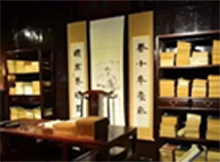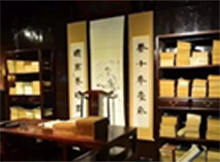China and Chinese culture—arguably the most
antique and persistent cultural tradition in human history—is relatively
unknown and often misunderstood outside of China.
There is and continues to be a profound asymmetry
in comparative studies. We enter a Chinese bookstore or a Chinese library, and
all of the most recent world scholarship is being made available in accurate
and accessible Chinese translations. We enter a European or American bookstore
or library, and never mind recent Chinese scholarship, but even the monumental
works of the greatest minds of Chinese philosophy and culture are absent.
Such an asymmetry in available information
is part of the reason why there are presently some 300,000 Chinese students
studying in the United States and only 15,000 American students studying in
China.
Where do we begin in promoting real world
literacy on Chinese philosophy and culture that will give China a place at the
table in a generation in which the economic and political orders of the world
have undergone a sea change? Will Chinese values and traditions be a resource
in a changing world cultural order that will follow in its wake?
In
this regard, we plan to make a real difference. "Translating China"
will bring together some of distinguished Western and Chinese experts on
Chinese philosophy for a unique translation project that will address the
aforementioned imbalances. One of two divisions of the translation project will
be dedicated to the translation of some of the most important philosophical
works of the following great Chinese thinkers into English:
• 庞朴 (, 1928-2015): Pang Pu is one of the most renowned experts
Confucian philosophy and culture and the winner of the 2010 Confucian Culture
Prize. Unjustifiably, his name is not known by Western scholars. To start with,
we are planning to translate《孔子文化奖学术精粹丛书:庞朴卷》into
English.
•
汤一介
(1927-2014): Tang Yijie, winner of the Confucius Culture Prize in 2011, is one
of the most important voices in the contemporary Chinese philosophical
discourse. He was a distinguished professor of Peking University and his work
on traditional Chinese philosophy and culture is held in high esteem within the
Chinese academy. He has been working as the director and chief expert in the《儒 藏 》编纂
中心, a project established by the Chinese
government. To begin with, we would like to translate his 汤一介哲学(北京联合出版社)into English.
•
李学勤
(born 1933): Li Xueqin is the most important Chinese historian, archaeologist,
epigrapher of our times. A distinguished professor of Tsinghua University, he
won the Confucius Culture Prize in 2013. He has served as Director of the
Institute of History of the Chinese Academy of Social Sciences, Director of the
Institute of Sinology of Tsinghua University, head of the Pre-Qin History
Association of China, and Director of the Xia–Shang–Zhou Chronology Project. We will
translate his book 《孔子文化奖学术精粹丛书:李学勤卷》first.
• 楼宇烈 (born 1934): Lou Yulie is presently one of the most
important senior professors of Chinese philosophy. Still teaching at Peking
University as a distinguished expert on Buddhism, Daoism and Confucianism, he
has been a major figure in the university’s Eastern philosophy teaching and
research section, the Research Institute for Religious Studies, and its
Academic Committee. At first, we would like to translate《中国文化的根本精神》(中华书局,2016年 ).
• 陈来 (born 1952): Chen Lai, a distinguished professor from
Tsinghua University and winner of the Confucius Culture Prize in 2015, is one
of the most prolific and respected Chinese philosophers of his generation. He
has enormously enriched the understanding of Chinese philosophical traditions
in their most fundamental and difficult aspects, and has laid basic foundations
for future discourses in modern Chinese philosophy. We will begin with 2014《仁学本体论》。
• 牟钟鉴 (born 1939): Mou Zhongjian, a
distinguished Zhongyang Minzu University professor who has been recognized with
many national awards (amongst them the 2012 Confucius Culture Prize), has dived
deeply into the ocean of Chinese philosophy and culture for more than 40 years.
Being an exceptional and distinguished thinker as well as one of the most
important figures in the revival and modernization of Confucian culture, we
plan to translate his 儒学价值的新探索into English.
郭齐勇 (born 1947): Guo Qiyong is one most renowned
scholars of modern Confucianism. As a
distinguished professor at the Institute of Philosophy and the School of
Chinese Classics as well as helding many leading and higher positions in some
of the most important Chinese commitees for philosophy, Chinese traditional
culture and education, like, for example, being the director of the Research
Centre for Confucius and Confucianism, he is considered as the leading and most
innovative expert for the development of modern Confucianism. We are honored to
translate his 《现当代新儒学思潮研究》
+[Learn more]
We
are especially pleased to have been able to engage a whole list of translators
which reads like the international "Who is Who" of the current
discourse on Chinese philosophy in the West and in China: Paul J. D'Ambrosio (East
China Normal University), Bobby Carleo (The Chinese University of Hongkong), Daniel Bell (Tsinghua
University and Shandong University), Andrew Lambert (The City University of New
York), Jeanne Allen (McMaster University), Hans-Georg Moeller (University of Macau), Kirill Thompson
(National Taiwan University), Martyna Świątczak
(Fudan University), Chad Meyers (East China Normal University), Dan Sarafinas
(Central South University of China), Asia Guzowska (University of Warsaw), Dimitra Amarantidou, (East
China Normal University), Sharon Small (Beijing University), Stefano Gandolfo
(Oxford University), Jana Rosker (University
of Ljubljana), Christopher
Ahn (Sunpress, NY).
The
first workshop which will bring together all of the translators, will be held at
the Confucius Research Institute in Qufu from January 19thto 21st,
2017. It will be a great event and is of utmost importance to have a good start
with the whole projects. The workshop will point the way to a successful future
project.
We expect the translation
project to be a historical event in the development of a persistent
Sino-Western discourse in philosophy in the 21stcentury. It will
show the modern characteristics of the Chinese spirit which at the same time is
rooted in the age-old traditions of the Chinese people and is embracing the
future in a multipolar and multicultural world-civilization.
+[Learn more]


